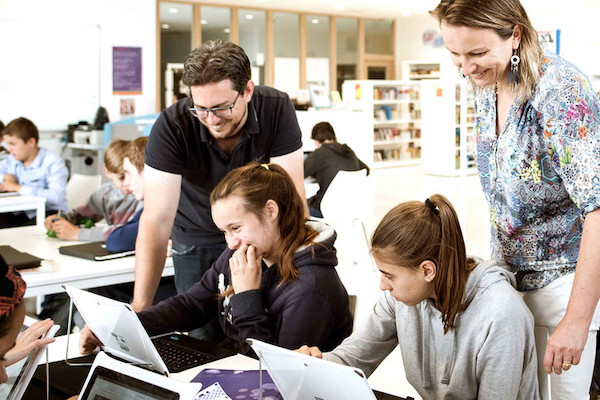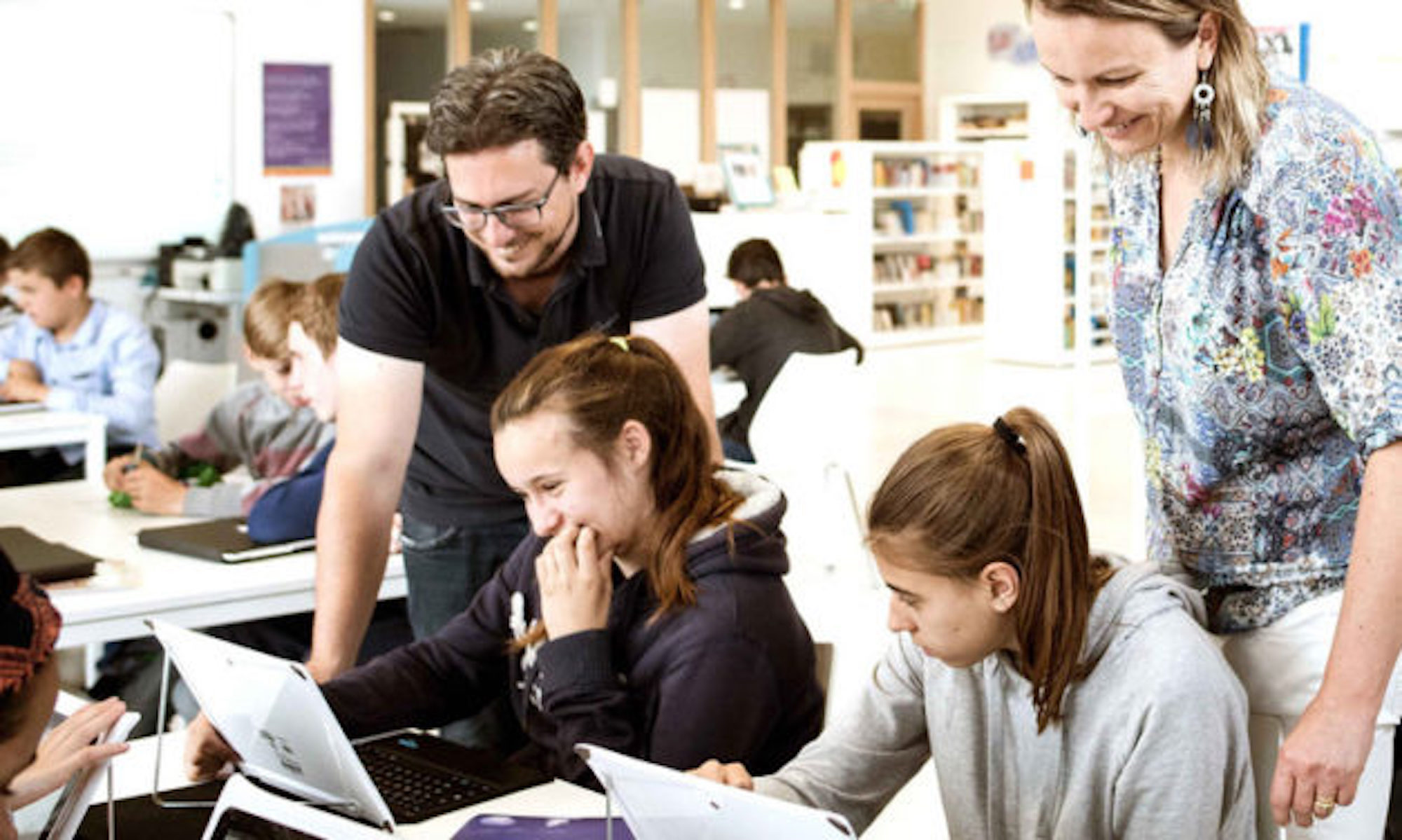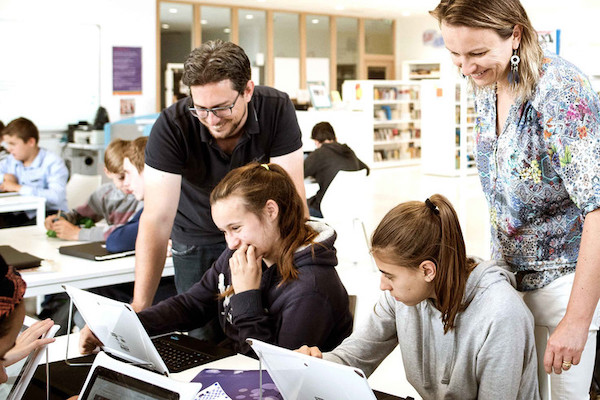As every year, the back-to-school circular from the French Minister of Education describes the priorities and new features that will come into effect from September onwards: reinforcement of media and information education, which will include " knowledge of rights and duties in the digital space and of the risks linked in particular to the use of social networks ", and "development of digital skills (...) with the roll-out of "Pix sixième" to all collèges".
In addition, 2023 will see the implementation of the Digital Strategy for Education 2023-2027, published last January. This strategy has since been translated into a technical doctrine, based on a platform approach.
With a view to reinforcing teacher training, a specific Pix, called " Pix+ Édu ", has been tested in a number of regions to prepare for the future introduction of digital skills certification for teachers.
Faced with the challenges of digital education, the French Ministry of Education plans to extend the digital awareness certificate ("Pix 6e") for 6th graders throughout France.
With the advent of portable devices, high-speed Internet access and e-learning platforms, the question arises as to the future of computer rooms. Educational communities and local authorities (responsible for the digital equipment of schools) are faced with a number of challenges: the high cost and maintenance of computer rooms, limited mobility for students and teachers, changes in learning methods, the integration of technology into ordinary classrooms...
Digital strategy for education 2023-2027
In January 2023, the French Ministry of Education released a digital strategy for education 2023-2027. The ambition of this document is to define the strategic vision of digital for education in France, for the period 2023-2027 "It aims to get the players to agree on a common vision, on unprecedented transformations, which will be to lead and succeed together."
In particular, the authors of the strategy note that "unequal access to digital technology " This can create difficulties for people who are digitally excluded or who have great difficulty accessing it. "This can create difficulties for people who are digitally excluded or who have great difficulty accessing it. (...) These difficulties of access to digital technology create inequalities in learning and place the issues of digital inclusion and equal access to the public digital education service at the forefront".
They also point to " a degraded user experience ". " Teachers, students, families or all education staff report difficulties in using the digital tools offered by the education ecosystem: complex and heterogeneous interfaces, unattractive, sometimes far removed from standards, unequally accessible and hardly adapted to mobility, lack of portability, data requiring multiple re-entries, connection breaks between tools, insufficient performance (...) These obstacles are all the more difficult for users to overcome as they are offered a significant proliferation of digital tools and resources without their uses being clarified, nor their access facilitated".
The Digital Education Strategy for 2023-2027 aims to address several challenges:
- Strengthen national and local cooperation between education players, around pedagogical projects mobilizing digital technology where relevant;
- Developing students' digital skills;
- Provide teachers with a clear offer, combining digital tools and resources to put digital technology at the service of student success;
- Develop the robustness, security, accessibility, quality and eco-responsibility of the Ministry's IT tools, to simplify the work of its employees and thus enhance the quality of the service provided.
A 4-pronged strategy
The strategy is based on 4 axes, each with several key actions.
An ecosystem committed to a shared public policy:
- Strengthen governance of digital education at national and local levels ;
- Share indicators for steering and evaluation purposes ;
- Define typical individual student equipment (middle and high school);
- Digital education that develops citizenship and digital skills;
- Ensure the acquisition of digital skills throughout the school career ;
- Enable students to become informed citizens in the digital age.
An educational community supported by a reasoned, sustainable and inclusive digital offering:
- Supporting the development of digital commons;
- Simplify access to digital services by creating a "resource account";
- Putting digital technology at the service of inclusive schools;
- Better training for educational teams in digital teaching methods.
Supporting teachers in digital education:
- Organize digital educational services around an interoperable platform ;
- Mobilizing data for the school.
New rules for a ministerial information system at the service of its users
- Accelerating digital transformation;
- Increase efficiency by expanding and supporting pooling;
- Improve fluidity and quality by integrating the principles of agility and user experience;
- Developing eco-responsibility.
To achieve all these objectives, the Ministry of Education intends to renew its partnership with local authorities, which "provide material resources such as infrastructure and terminals, install and maintain them, and increasingly finance teaching resources ". This partnership will have to " take account of technological developments, notably the omnipresence of cloud-hosted solutions, hardware (smartphones, tablets, laptops, interactive and immersive media), and the emergence of ENTs (digital workspaces). We also need to understand the "out-of-school" dimension of digital education. This new partnership needs to be forged at different levels - academies and regions, academic departments and départements, inter-municipalities, basins and communes".
Référence :
Supporting the development of digital commons
The digital strategy devotes a chapter to the "digital commons". By this it means "a set of digital resources produced and managed by a community. By their very nature, they are shared and collective". It mentions several tools available to teachers:
- The apps education.fr service platform, which provides collaboration and communication tools such as " virtual classrooms " and video-agents, as well as file-sharing and video-publishing tools hosted on French infrastructures.
- The Éléa platform, based on open-source Moodle software, which enables teachers to create and share open educational resources and scripted digital learning paths for their students.
- The "Magistère" platform, which provides teachers and all Ministry staff with a wide catalog of online training resources.
"This first version of the national offering will be enhanced according to a roadmap agreed with all players, local authorities and EdTech companies."
Teachers, particularly at NSI or SNT, are waiting for a "forge" that would enable them to collaborate with peers and share computer code. The Ministry has announced the availability of a forge that is technologically sovereign and shared nationwide.
A technical doctrine for digital education
Following on from the strategy, in May 2023 the French Ministry of Education published a " technical doctrine for digital education ", "to establish a framework of common architecture and rules, aimed at providing users with a legible and structured set of simply accessible and interoperable educational digital services".
Towards an open, interoperable ecosystem
This technical doctrine takes into account the accelerated growth in the use of digital educational services in the 1st and 2nd degrees since 2020. "More and more are being used, not only for administrative purposes and to keep track of schooling, but also for pedagogical activities and to implement educational missions. The logical corollary is a consequent increase in the use of services, which requires both perfect control of data and an open, interoperable ecosystem".
A platform logic
The idea is for the State to guarantee " every player in education equal access to and simple use of digital services in a secure, open and interoperable ecosystem, for the purposes of implementing learning within the framework of the programs and skills repositories of the Ministry of National Education ". To this end, "digital education must be developed according to a platform logic, in the sense of a set of players respecting an architecture framework and common rules and standards, to provide users with a legible and structured set of services that are easily accessible and interoperable (...).) The public education service thus gains in agility, enabling users and companies in the digital education industry to benefit from innovative services, but also in sovereignty, by excluding any solution that does not respect the rules laid down, particularly in terms of ethics and data protection".
Lastly, the technical doctrine refers to three standards currently being drawn up, dedicated to interoperability, security and digital responsibility requirements, which are intended to be enforceable by law".
Référence :
Pix+ Édu: towards certification of teachers' digital skills
Almost all education staff use digital technology to prepare their lessons ( Profetic 2018 survey).
Only 16% of primary school teachers and 29% of secondary school teachers feel well or very well prepared for its use in their initial training(Cnesco 2021 study).
With a view to strengthening teacher training, a specific Pix, called " Pix+ Édu ", has been tested in a few territories to prepare for the future introduction of the Pix+ EDU certification of teachers' digital skills.
This self-assessment course enables teachers to take stock of their level of mastery of digital skills for teaching, and to access online training resources.
Pix+ Édu covers transversal and professional digital skills, differentiated for 1st and 2nd grade. It takes the form of questions, with recommended tutorials.
Référence :
A digital awareness certificate starting in 6th grade
Faced with the challenges of digital education and, in particular, to raise awareness of the fight against cyberbullying, hate speech and illicit online content, the French Ministry of Education plans to extend the digital awareness certificate to all 6th graders.
Nearly 110 volunteer middle schools experimented with it during the 2022-23 school year.
In 2023-2024, " Pix 6e " will be extended to all middle schools.
Pix 6ème gives rise to a certificate guaranteeing that pupils have benefited from this awareness-raising program. It includes a specific "protection and safety" pathway, which targets 4 skills:
- securing the digital environment ;
- protect personal data and privacy ;
- protecting health, well-being and the environment;
- prevent cyberbullying.
Since the 2021-2022 school year, Pix has been generalized from the 5th grade onwards, with compulsory digital skills certification for students in 3e at collège and Terminale at lycée général, technologique et professionnel.
Référence :








